The discussion on internet governance is not new, but the year of 2024 is bringing opportunities for us to effectively move towards an open, inclusive, democratic internet aligned with human rights. In the coming months, a series of international milestones seek to contribute to the Global Digital Compact – which can be signed by UN member states in September – and for the Internet Governance Forum – which will take place in December. An important step in this journey was taken at the end of April in São Paulo, where representatives from over 60 countries and multiple sectors met to discuss the new collective declaration of NETmundial+10.
This blog post seeks to share aspects of the debate that are being closely followed by our team.
Celebrating a decade since the publication of the first document, NETmundial continues to be recognized as a crucial milestone for the digital ecosystem, in which Brazil intends to strengthen partnerships and broaden the perspective of negotiations to include positions from the Global South. The country, in fact, incorporated the theme of Information Integrity into one of the G20 side events on April 30 and May 1, during which representatives from the UN, UNESCO, and various other stakeholders discussed measures to combat online misinformation. Wiki Movimento Brasil was there with staff from the Wikimedia Foundation advocacy team, establishing dialogues and promoting commitments fundamental to the Wikimedia ethos, which can inspire and strengthen other public interest projects, such as Wikipedia.
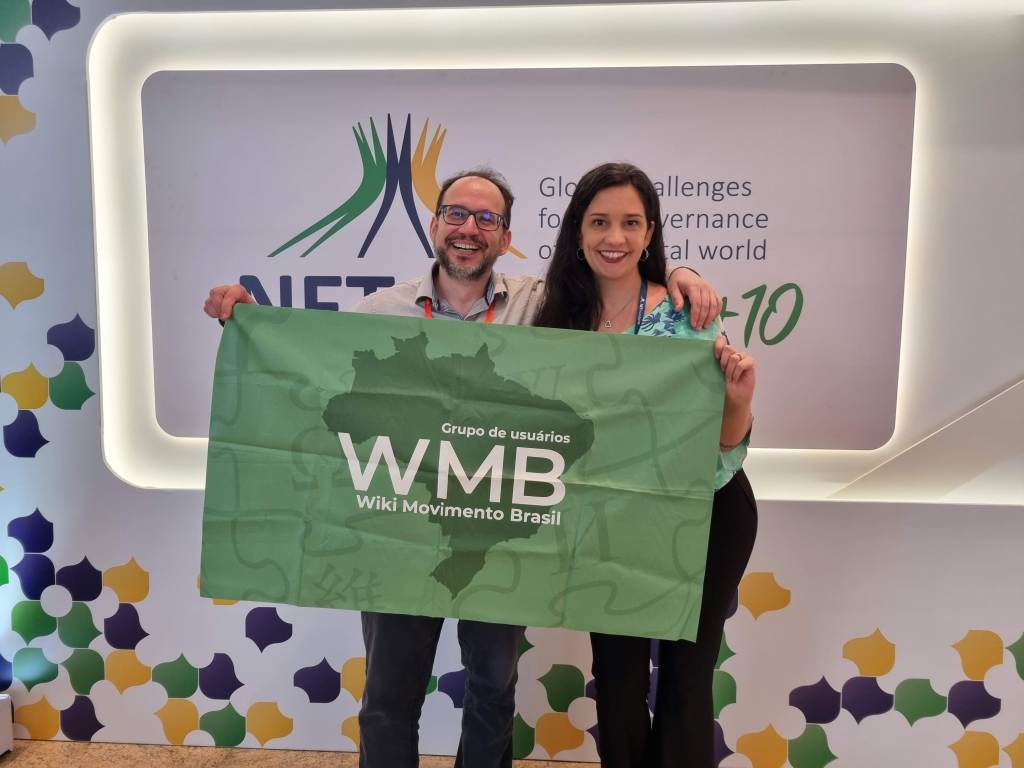
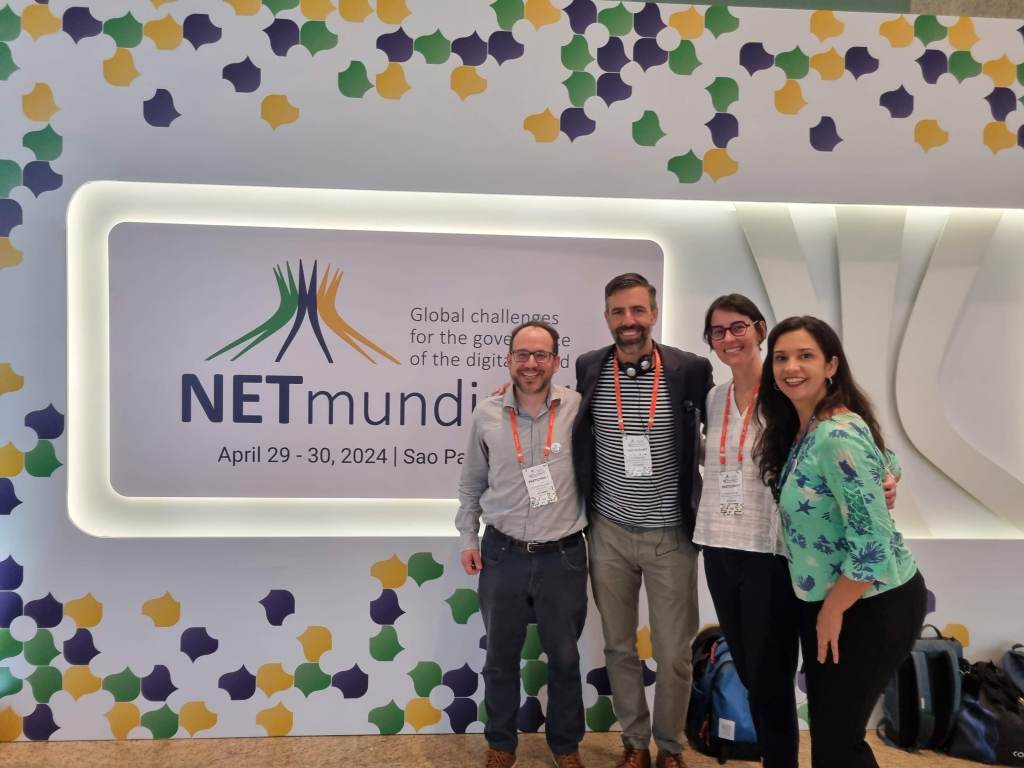
According to the executive director of WMB, João Alexandre Peschanski:
“While recognizing the importance of the collective construction promoted in spaces like NETmundial and celebrating the concrete possibilities for contribution, we note that there is still a need to advance in recognizing power imbalances between different sectors; for example, big techs companies are generally not addressed by the disproportional power they wield in some negotiations”
From our perspective, there is also a lack of more commitment to the idea of the internet as a global public good. These were some of the contributions of WMB to the public consultation on the preliminary document, through which NETmundial received 154 suggestions aimed at defining guiding principles for decision-making processes related to the internet.
Check out the video with interviews conducted by our team during the event:
On the first day, after the opening session moderated by Hartmut Glaser, Executive Secretary of the CGI (Internet Governance Committee in Brazil), featuring speeches from ten representatives from sectors such as the Brazilian, German, and U.S. governments, academia, technical sector, and civil society, the panel “Global Challenges for Governance in the Digital World” also took place. Moderated by Renata Mielli, Chair of the event, the panel promoted a comprehensive discussion on the central challenges of governance.
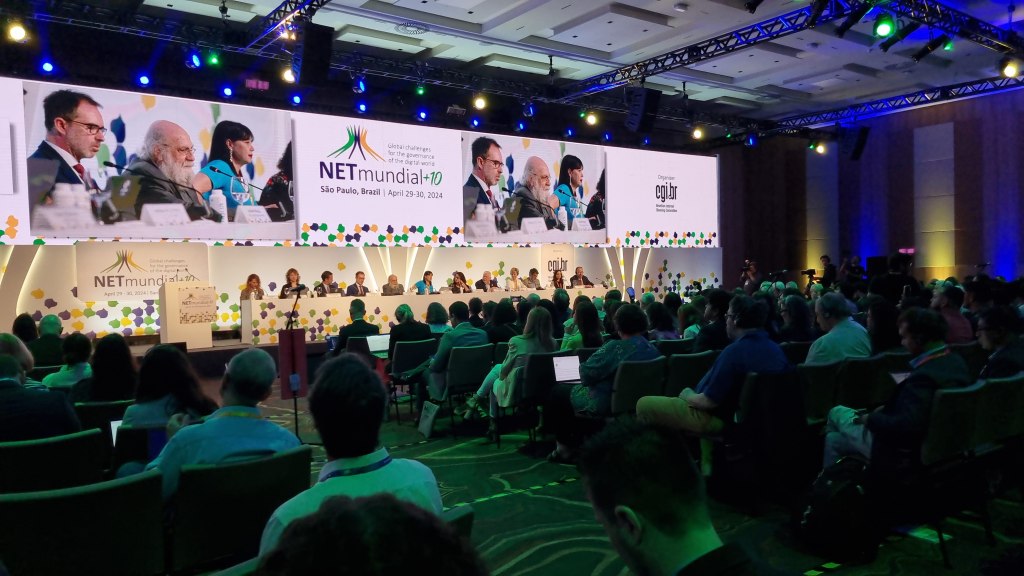
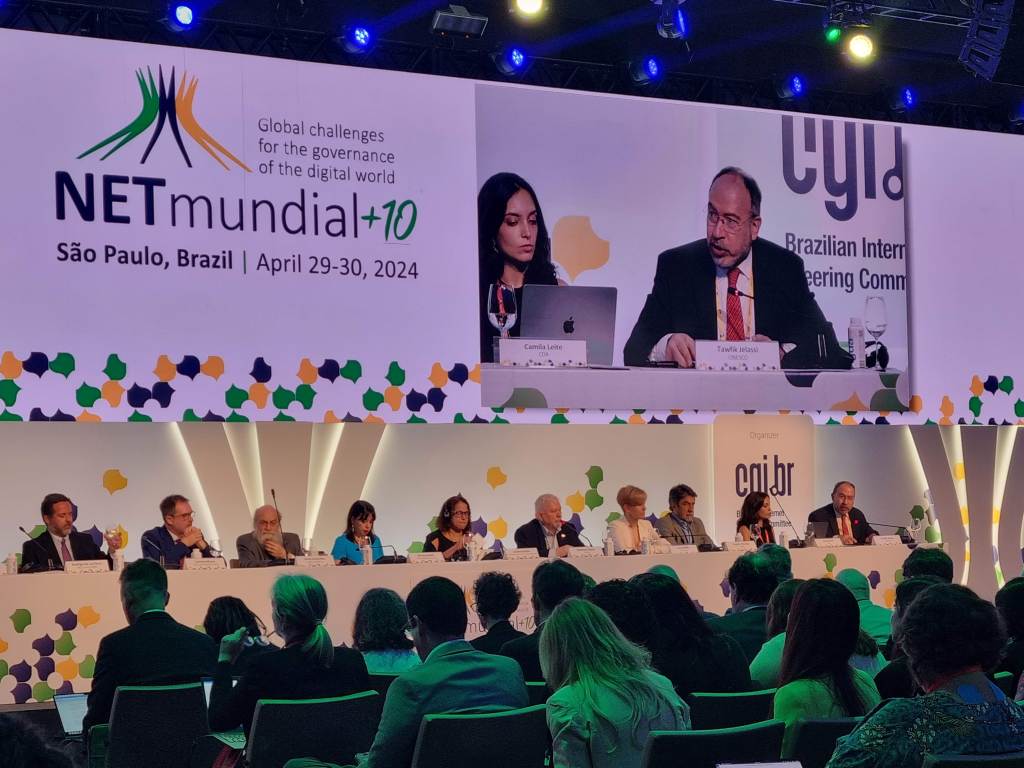
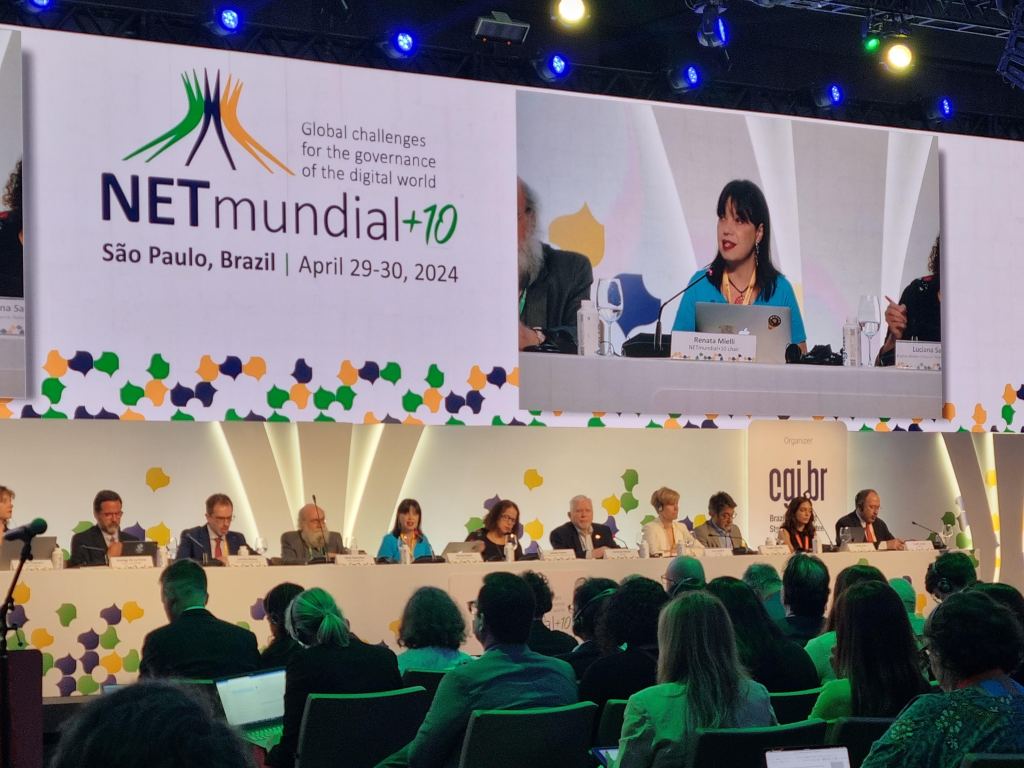
The program continued with a detailed presentation regarding the contributions received in the consultative process, in which Bertrand de La Chapelle, co-founder and executive director of the Internet & Jurisdiction project, provided a view of the level of agreement by the contributors with a set of statements, and detailed the positions bright in the proposal. Shortly after, the first two working sessions were held, in which all participants – both present and online – could have a speaking opportunity at one of the microphones in the room: each microphone was dedicated to a specific sector (civil society, technical sector, academic, governmental, and private sector). The first topics were related to principles for governance processes and guidelines for the implementation of multistakeholder mechanisms.
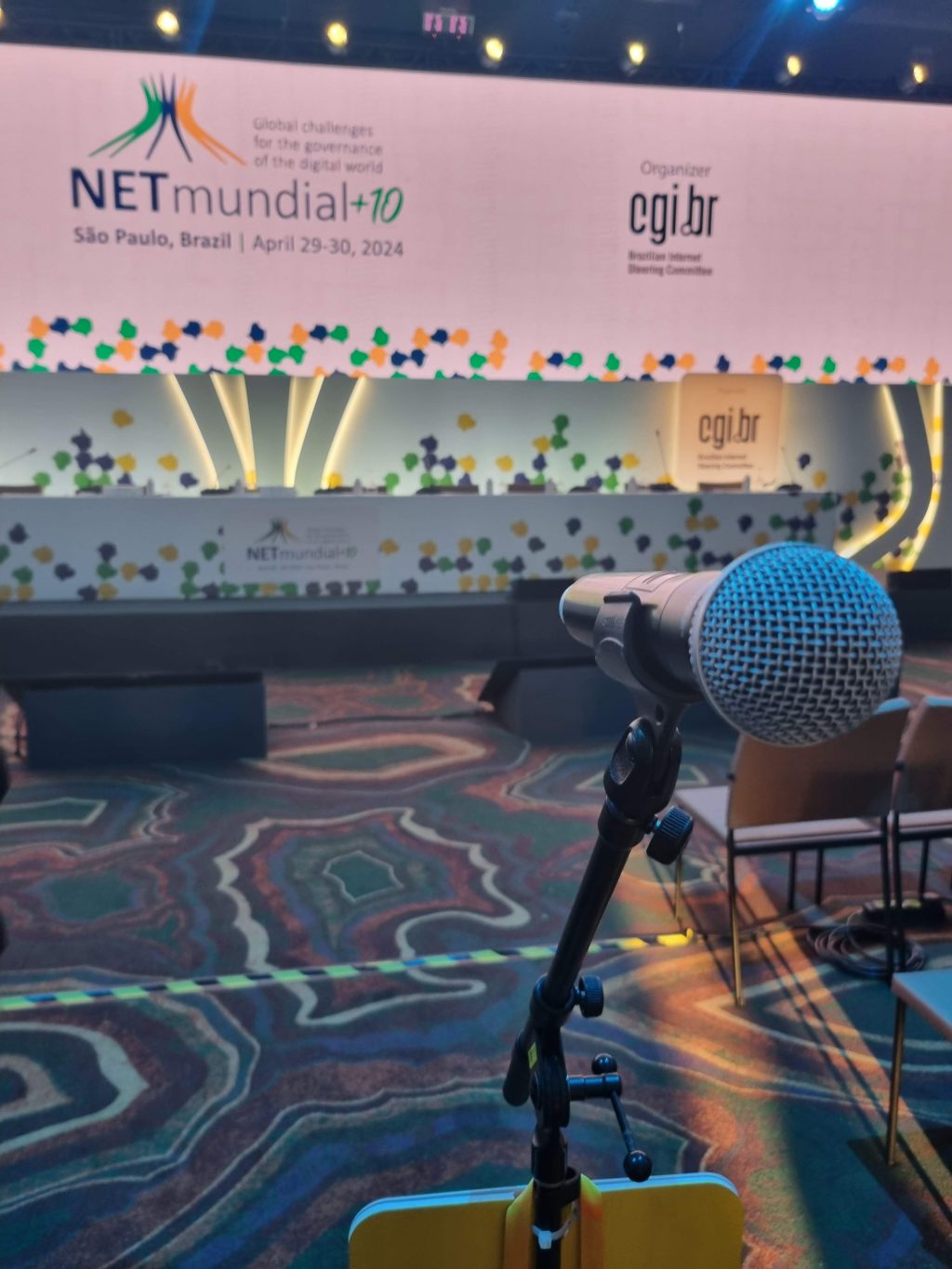
On the next day, the first moment provided separate spaces for open discussions among participants from each sector, in a self-organized moment of dialogue and exchange of views. Following that, the third working session sought to generate inputs for ongoing processes, such as the Global Digital Compact, the Internet Governance Forum, among others. Two more panels highlighted the importance of the event’s results being implemented by the community, and the need for coordination efforts among different digital governance arenas. Once again, the microphone was open to audience contributions.
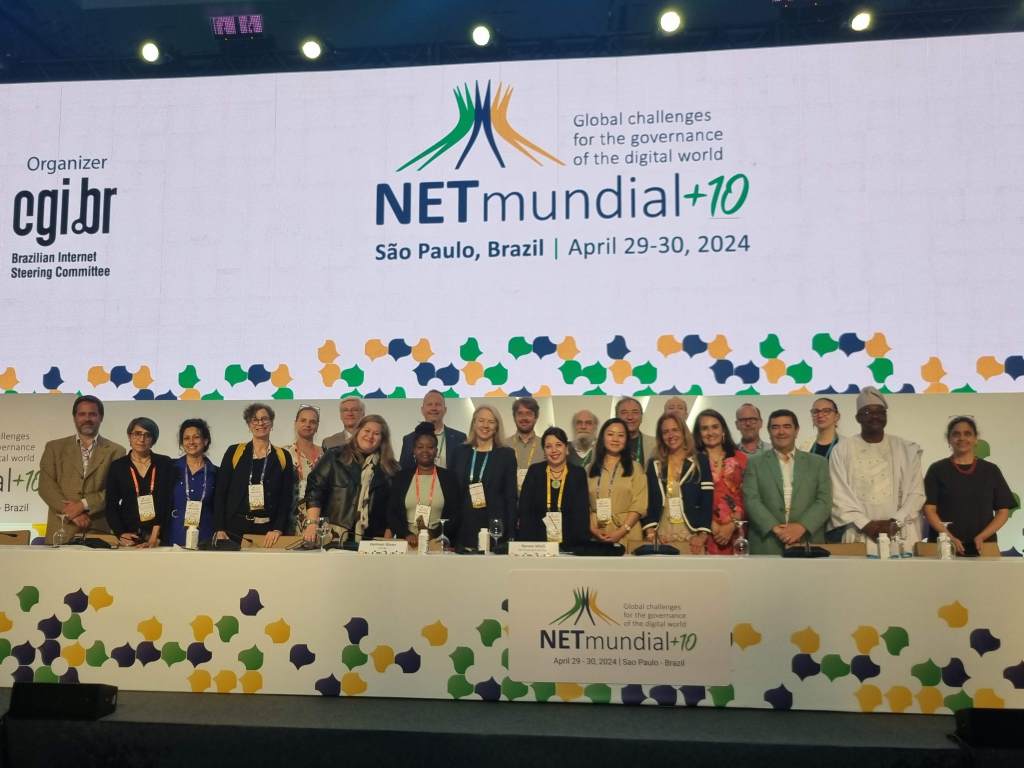
After two days of debates, the final statement was read and celebrated by the audience present at the closing session. The NETmundial+10 multistakeholder statement: Strengthening Internet governance and digital policy processes is the outcome of this participatory process, and, although it has not explicitly state a commitment to the principle of the internet as a global public good, it addresses some points regarding power imbalances, as follows:
Multilateral processes need to become more inclusive to ensure the meaningful participation of all stakeholders, especially from the Global South. Incorporating diverse voices and multiple worldviews by involving broader stakeholder input can enhance multilateral processes.
(…)
significant investments in capacity-building and education to strengthen each step of the process are vital to achieve effective contributions. It is important that such investments account for the relative power differences between and within different stakeholders and stakeholder groups.
(…)
It is, therefore, essential to foster a safe, trustworthy and fair environment where imbalances between participants are addressed, and civil society, the private sector, academia and the technical community are able to meaningfully participate in multilateral processes.
Promote more connection between debates
Another relevant aspect of the current discussion is the importance of avoiding fragmentation in the various approaches to the digital universe. Even though each forum or collective has its specificity, it is necessary to ensure conceptual alignments and reinforce principles common to all of them. At the very least, make clear the points of contact and divergence, and make discussions more connected and public. The NETmundial+10 statement also revealed that this is a relevant aspect for the multiple sectors involved:
In the spirit of the multistakeholder principles, multilateral processes should evolve. They must share the scope of their work and publish a commitment regarding transparency of the process, including but not limited to a timeline highlighting critical opportunities for participation. As part of that commitment, a regular schedule to inform about their progress – or lack thereof – must be made available, including public access to specific outputs.
(…)
Robust accountability mechanisms should be part of all multilateral processes, so that there are clear steps and deadlines for the implementation of recommendations. Concrete mechanisms for reflection about the impact of their decisions and the status of implementation of their recommendations are key for continuity. Efforts to accurately document each multilateral process should be made, including concrete steps to identify linkages with other similar processes.
Similarly, for contributions to support discussions at the local, regional, and international levels, it is essential to have coherence and consistency in the positions of organizations and movements like ours. With the proliferation of meetings and forums, it becomes even more relevant to establish and reinforce some pillars that cannot be overlooked, both in discussions about processes – such as NETmundial – and in debates about the content circulating on the internet. In this sense, this is what the Wiki Movimento Brasil sought to do by publishing the article “Three commitments in defense of a free, collaborative, and diverse internet”, on the Le Monde Diplomatique Brasil portal.
By highlighting that regulatory measures typically target commercial platforms and, by ignoring that the internet is a diverse environment, can have unintended consequences for free and open digital projects, the article reinforces the stance: regulations must promote an internet where public interest projects can thrive. These projects include scientific, cultural, and cartographic repositories, code sharing environments, as well as Wikipedia itself. Therefore, the article helped disseminate our three main principles proposed by the movement in defense of a free, collaborative, and diverse internet, as a contribution to the Global Digital Compact.
Our collective contribution to the Global Digital Compact
Still under construction through a consultative process involving governments, the private sector, organized civil society, community organizations, academia, and individuals, the Global Digital Compact is the UN’s first attempt to create a shared vision on how digital technologies should be governed. Similar to the Sustainable Development Goals, the GDC represents an international effort to ensure that technologies are used responsibly and for the benefit of all people, promoting a safe and inclusive environment. Expected to be signed at the Summit of the Future in September, this pact will help shape the future of digital cooperation and regulation for many countries around the world.
As seen in the Diff post on this topic:
We want the Global Digital Compact to ensure that spaces exist in that digital future for community-led models centered on the public interest. This is especially important at a time when policymakers’ attempts to regulate the largest for-profit technology companies are increasingly resulting in unintended adverse consequences for community-led platforms like ours. The time to shape the text of the Compact is now, and Wikimedians have a unique story and experience to share.
In this sense, the article published in Le Monde Diplomatique Brasil also helps disseminate the collective contribution of the Wikimedia Movement, materialized in the Open Letter drafted among editors of the core working group of the Wikimedia Advocacy Collaboration campaign. Wiki Movimento Brasil actively participated in drafting the letter, alongside editors from other 11 affiliates and the Wikimedia Foundation team. According to the Executive Director of WMB, João Alexandre Peschanski:
“This is a collective response from our movement to promote an internet governed by principles of openness, inclusivity and respect for human rights. We now need to show even more unity and capacity of mobilization in defense of the wiki way, in a rapidly changing digital ecosystem”
The Open Letter receives signatures
Released on April 23, the Letter remains open for signatures from all individuals and groups interested in contributing to this vision for the future of the digital world in supporting sustainable development for everyone, everywhere. Drawing from two decades of experience in developing open systems, creating and sharing educational content and free information, the group proposes that the GDC commits to:
– Protect and empower communities for the collaborative management of online public interest projects. Global projects for free and open knowledge, like Wikipedia, should not be an exception on the internet, and the international community must ensure a regulatory environment where communities can build and manage their public interest projects and where new spaces for cultural and educational exchange can emerge.
– Protect and promote digital public goods by supporting a robust digital commons from which everyone, everywhere can benefit. Free digital environments depend on the consolidation of the public domain and the dissemination of open content under a free license. Only in this way will it be guaranteed the right of any person to access open educational resources or contribute to open-source projects, or collaborating and sharing ideas in a secure infrastructure. These environments should be multilingual so that people can learn in their own language and be based on ethical cultural practices, respecting differences in worldviews regarding knowledge digitalization.
– Build and deploy Artificial Intelligence (AI) and Machine Learning (ML) to support and empower, not replace, people who create content and make decisions in the public interest. AI can significantly contribute to the advancement of the Sustainable Development Goals, for example by assisting people in searching for and verifying knowledge. However, it is crucial that such tools be developed in accordance with international human rights standards, ensuring participation through transparent and open processes controlled by the communities they seek to serve.
We, the Wiki Movimento Brasil, value the participatory process in spaces like NETmundial+10, the Summit of the Future, the World Summit on the Information Society (WSIS+20), the Internet Governance Forum (IGF), among many others, and consider it important to seize the opportunities to contribute, as this is the moment to co-create the future of internet governance policies. Our recommendations aim to strengthen a global vision of the internet that combats misinformation, protects human rights, and enables our mission: to empower all people to access, develop and globally disseminate knowledge for everyone, everywhere.

Can you help us translate this article?
In order for this article to reach as many people as possible we would like your help. Can you translate this article to get the message out?
Start translation